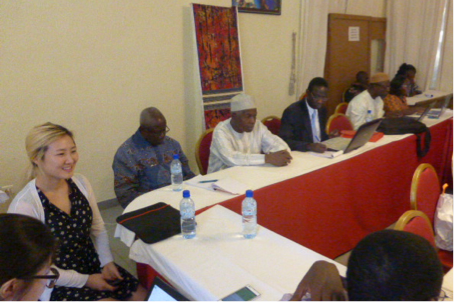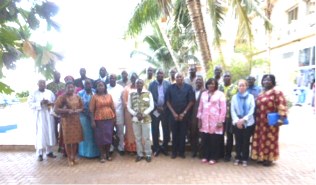Meeting of the WGNFE Consultative Committee in Ouagadougou
The Consultative Committee of the WGNFE met in Ouagadougou on the sidelines of the workshop held to validate the WG’s 2014 output.
In addition to the committee members, several observers and guests were present, including the Korean association Education Without Borders (EWB), which is very active in Africa. The WGNFE received substantial support from EWB in 2014 for the peer reviews in the Republic of Congo and Burkina Faso.
 The participation of representatives of the Korean association EWB and other international institutions enlivened the discussions at the December 2014 meeting of the WGNFE Consultative Committee. | The purpose of the meeting was to review progress on the implementation of the recommendations made by the committee at its June 2014 meeting and to present the activities planned for 2015. Noteworthy progress has been made on 12 of the 13 main recommendations made in June 2014. Only the recommendation to open the Zankey Faba website to languages other than French and English has not begun to be implemented. |
The suggestions and recommendations include:
- stepping up collaboration between the WGNFE and sister institutions such as ERNWACA, RECOPA, Tin-Tua (Burkina Faso), AREN (Niger), POTTAL MEN (Benin), ARED (Senegal), and the EDM-APENF Consortium;
- opening up the Zankey Faba website to African languages, ensuring before publication that the documents in these languages are of good quality;
- trying to raise funding to cover the activities related to administration of the Zankey Faba website. On this point, a request will be submitted to the Swiss cooperation agency DDC and to other partners.
 Group photo in the garden of the Pacific Hotel in Ouagadougou at the end of the workshop. | The members of the Consultative Committee volunteered to help with the finalization of the studies presented at the meeting. Concerning the 2015 Program and Budget of the WGNFE, the Consultative Committee recommended taking greater account of the concept of the “holistic vision” in programs and increasing the WG’s participation in regional and sub-regional programs such as RAMAA and Global Coalition. |
For further information, please contact Ibrahima Bah Lalya, Coordinator, ADEA Working Group on Non-Formal Education (WGNFE), lalyabah2@yahoo.com